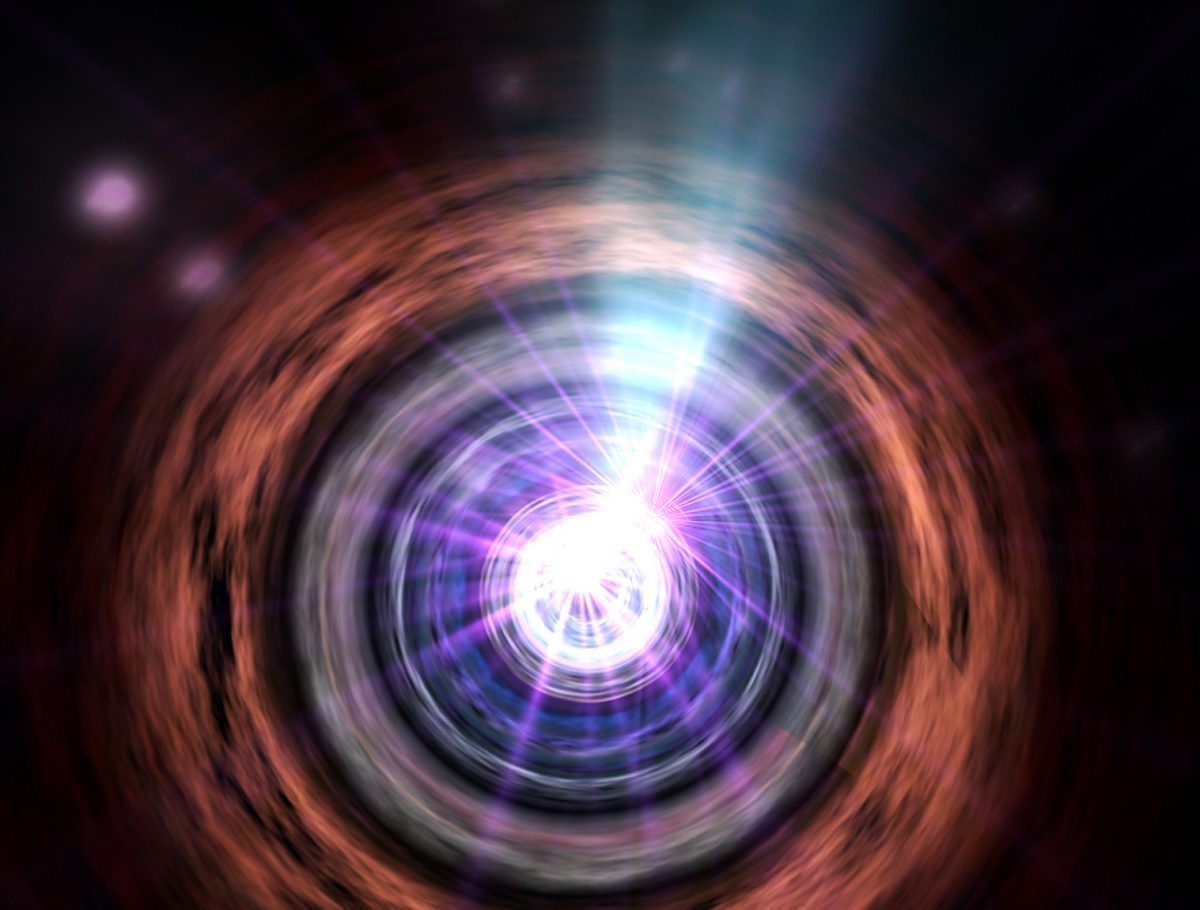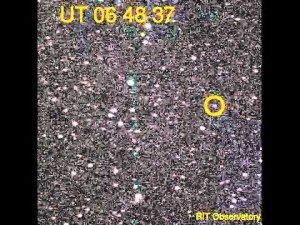One of the most popular questions asked about relativity concerns what would happen as an object approaches the speed of light. If it were moving fast enough, would it become a black hole? The same question could be asked another way: are you a black hole? The answer to the second question is obviously no. So is the answer to the first question. Confused?
The basic argument is as an object approaches the speed of light from our perspective, three things happen. It’s time appears to slow down (time dilation), it appears to get shorter along its direction of travel (length contraction), and its mass appears to increase (relativistic mass).
These are all consequences of relativity and the fact that light has the same speed in all frames of reference. Relativity also says that a large enough mass in a small enough volume becomes a black hole. So it seems reasonable that an object near the speed of light should become a black hole.
If that were true, you must be a black hole.
Here’s why: the Universe is expanding. It’s not just that galaxies are racing away from us, space itself is expanding. This means that the more distant an object is from us, the faster it is moving away from us. There are distant galaxies moving away from us at nearly the speed of light. That means we are moving away from them at nearly light speed, so we should appear to be a black hole to them.
But the thing about black holes is that you either are one or aren’t one. A black hole’s event horizon must exist in all frames of reference. So if you aren’t a black hole in your frame of reference (and you’re not) then you’re not a black hole in any frame of reference. So a fast moving object does not become a black hole.
So what gives? It turns out the original argument is flawed. It’s true that an object’s relativistic mass does increase with speed. This means they are increasingly difficult to push, making it impossible for them to reach the speed of light. But everything is relative. From our perspective we have to keep pushing harder. From the object’s perspective our pushes keep getting smaller. As far as the object is concerned it’s mass hasn’t changed. So naturally it doesn’t become a black hole.
Just as you aren’t a black hole because you’re speeding away from distant galaxies. An object speeding away from us doesn’t become a black hole.












Comments
Why not use a simpler explanation without an observer in a distant galaxy?
The basic property defining relativity is that the physics is the same whether described using a standard perspective or a moving perspective.
And since “being a black hole” is an objective physical property, as you explained well, if we’d consider a fast-moving object to be a black hole, it would look like a black hole is there from the perspective in which the object is standing still.
Considering any object at all, if moving fast would make it into a black hole, then just writing down the physics in a perspective in which it’s moving near the speed of light would imply it’s really a black hole. This would mean that any thing at all is a black hole, from any perspective.
So it’s couldn’t be the case that moving fast would make stuff into black holes.
Can we use the “far away” galaxies receding at or beyond the speed of light from us as a reference for relativistic mass? After all nothing, moving THROUGH space, can approach the speed of light in any frame of reference. I though we always made the distinction about the expanding universe, where the space itself is moving (at any speed it likes, no bounds). So I think there is a logical error in your argument: the assumption that we are moving “fast” therefore our relativistic mass should increase, when the movement is due to expansion of space is false to begin with. Isn’t it?
The cosmic expansion is an aspect of general relativity. The real point is that relative motion doesn’t affect how you perceive yourself. Black holes are defined by global properties, so a black hole will be a black hole in all frames of reference.
So if we wanted to send a probe to the nearest star, how do we calculate at what probe speed, the time spent here on Earth is the shortest? Lets assume 4 light years with constant acceleration and deceleration periods.
Whoa! I thought that E=mc2 meant that the closer I, i.e. my “mass”, gets to matching light speed the closer I, again my “mass”, gets to being converted/transformed into pure energy. But you’re telling me that as that event occurs, my mass is actually increasing! I weigh quite enough as it is. But more importantly, beyond my current diet and jogging routine is my confusion. Please lighten my load by (en)lightening me! (An essential caveat to helping me meet my newest goal is that you respond in plain — and I mean real real plain — English.)
Thanks
Now I’m no expert on this topic, but to my knowledge, mass is only an expressed form of energy, and the energy density itself warps space-time and thus experiences what we commoners call gravity. It’s just not what we usually call energy since it is neither in the form of radiation nor kinetic energy, rather….erm…potential gravitational energy, of sorts?
Likewise, if you add energy to an object, its mass increases. This not only applies to energy in the shape of speed, but also potential or chemical energy.
For example, if you compress a spring, it actually becomes a tiny bit more massive due to the potential energy stored in the object.
I’ll let you know more once I get around to studying physics 😛
‘Really appreciate your reply but you’re clearly far more scientifically sophisticated than I can ever hope to be. Nonetheless, you’ve opened my eyes to something new: the differing “character(s)” of energy. I just assumed that no matter its source — whether from a box of Wheaties, a wildfire or a full tank of gas— it was, well… “pure”, i.e., always speaks the same “language” once activated. Anyway, despite or perhaps because of my feeble comprehension, I find physics and cosmology beyond fascinating (although there have been times when, confused, I affirmed the same interest in cosmetology).
From what I understand, E=MC2 doesn’t say an object going really fast is gaining mass. It seems to gain mass to an observer, but the object itself feels the same mass.
Let’s think of a bullet and a gun. While the bullet itself is not heavy at all, when you use a gun and shoot it, the bullet now appears to have gained mass and is now able to create a hole in the wall.
The bullet itself didn’t gain mass, but its kinetic energy makes it seem to have gained mass. It takes a lot more energy to make it stop the faster it goes.
If the bullet is going at the speed of light, it doesn’t weight more, but it’s kinetic energy makes it seem to have gain infinite mass. It will take infinite energy to make it stop, or go faster.
Since it’s real mass didn’t change, it cannot generate more gravity than when it’s not moving. Also it cannot become a black hole.
Well I’m no scientist but this is how I understand the physic behind it. Let me know if I’m lost in the void of stupidity. And also I hope my English is good enough so you guys understand.
You explained it well and i found it simply understandable and logical when using scientific facts.
Don’t worry, from your frame of reference you haven’t gained a pound 😉
Others will definitely think you’re heavier though. But you’re clearly still fit, seeing as you’re running at a reasonable fraction of the speed of light.
Thanks. Good to know. Although the concept of converting from a too heavy mass to a svelte energy is really quite appealing to me I wanted to keep enough brain mass to become aware of my transformation and new found ability to travel at near light speed. ‘Sincerely don’t want to come off as a smart ass but have to acknowledge my ongoing frustration in attempting to figure out this the universe and my place in it other than means of Star Trek.
Is the argument of the distant galaxies speeding away from us and not turning into black holes in the process even viable?
In my current understanding, extremely distant objects do appear to move away from us (the very, very far ones even faster than the speed of light if I’m not mistaken), but they don’t have a speed in the traditional sense, as in they don’t move THAT quickly through space, but rather the space moves them by expanding, if that makes any sense.
Mampfer: There is nothing worst than incomplete knowledge. I always thought that black holes are uniquely formed when giant stars collapse to infinity forming what we know as a black hole, now speed have a participacion in the formation of black holes. I don’t understand.
To my own understanding, in Classical Physics, time is a universal constant progressing at a fixed rate in all reference frames that is independent of motion and the spatial three-dimensions, length, width and height, aka x, y & z. That way, you can determine where a certain object is in space at a given moment in time. In other words, locating OBJECTS in SPACE at a given moment in TIME. In relativistic context (Einstein’s Theory of General Relativity,) space and time are combined into one continuum, that is “spacetime,” and mathematically expressed as one manifold of multiple events. These events are described by a coordinate system of three spatial dimensions, length, width and height, and one temporal dimension, that is time. In that sense, time is dependent on an object’s velocity and elevation, hence, gravity. GR posits that the rate at which time passes slows down when an object speeds up. It also posits that the rate at which time passes slows down when an object is stationed at higher elevations. That’s what’s called “time dilation.” That way, you are locating EVENTS in SPACETIME as opposed to locating OBJECTS in SPACE at a given moment in TIME
Photons: are they really massless? Experimentally, m=0 does not seem verifiable. If photons have mass, then bending of light by stars could be used to calculate that mass. Is light (photons) slowed by gravity? Then, again, mass could be calculated. A black hole emits no light directly, so what is the minimum mass of a black hole? That black hole mass should enable calculation of the mass of a photon.
Light (photons) are said to have same measured speed in vacuum (approx. 300K/sec), but is that not measurement executed within the internal experimenter’s frame? If that frame, viewed by an external observer, were moving, then it would seem that the internal experimenter’s light (photons), viewed by an external observer, would be subject to the same effects of time relation as the experimenter – or would it?
Its better to think about black holes require a minimum density, not minimum mass.
Don’t make this so hard. One main problem in discussing General Relativity is not using proper identifying properties of an object. In this case the “Mass” of an object.
Objects have two mass components or properties: Rest Mass and Inertial Mass. The two components are not the same thing. Rest Mass is the actual material the object is built from; Inertial Mass is the component/property which makes acceleration harder as the object goes faster and faster.
When an object approaches light speed only the Inertial Mass increases; Rest Mass always stays the same. Example: If a chocolate chip cookie is accelerated, one does not get more chocolate chip cookie. The Universe wouldn’t know how to go about it. What would be created first as the cookie moves faster and faster: Cookie dough, or should it be the chocolate chips that get priority? And where on the cookie should the Rest Mass increase take place? In front?, On the surface?, Inside? Since there are so many possibilities to add more cookie, (and chips), the Universe has a simple solution – do nothing.
There is simply no mechanism to increase Rest Mass by speeding an object through space from
point A to point B.
Another happy “Out” for the Universe is there’s no need to fiddle with the object’s gravity as it’s speed increases. All gravity comes from Rest Mass. If you don’t increase Rest Mass you don’t need to worry about playing around with the new gravity field that comes with new Rest Mass. The Universe is lazy, so why bother goofing around with Rest Mass just because it wants to move from here to over there.
Hence, an object at rest has the same gravity field strength as when moving near light speed. Nothing changes as far as Rest Mass and gravity field are concerned.
The reason an object cannot become a black hole moving near light speed is because it’s Rest Mass doesn’t increase. No increase in Rest Mass, no increase in Gravity. Poof, no black hole.
Inertial Mass is something else, and is mind boggling huge as it approaches light speed. If the object hits you, your toast.
So then light which has a rest mass of zero, would generate no graviational field , ever ?? I can’t see this happening. If I had an electron and positron which had definite rest masses and small gravitational fields. Let them annihilate each other and produce gamma rays. The gamma rays have no rest mass and thus no gravity ??? I don’t understand this.
The big bang theory is based on one thing: redshift. I’m still not convinced that it’s right, because we could be getting fooled by the redshift. The farthest objects are redshifted the most, but maybe there’s some process that redshifts the light, or increases the wavelength, over distance. It still seems wacky to have to explain this supposed expansion of the universe by saying space itself expands. It takes energy to accelerate a mass. Imagine accelerating a motorcycle, then a bus, then a train. It gets harder and harder and takes more energy to move them. Now accelerate a planet, a sun, and an entire galaxy! It’s just nuts to think that empty space just grows and to believe that will move entire galaxies apart, even accelerating them apart…as if a vacuum has any power to push masses around. Some of these theories, especially those of Stephen Hawking, seem to be little more than mathematical masturbation, with no root in reality or common sense.
Space must expand. Why? If our Universe is cooling down, all the heat energy has to go somewhere. If it is deposited into the same volume and has no thermal release, the Universe would never cool down. The “empty” space would heat up eventually making the Universe one hellish place. Even if the Universe was constantly slowing it’s expansion from the big bang, the Universe would be heating up on average, just slower. For the Universe to cool down, the expansion must be either continuing expansion at a steady pace or must be accelerating.
Now the crazy, the expansion is occurring everywhere. It’s just that you need really big spaces to measure any expansion right now. The space between your ears is expanding. But don’t worry, it will take billions of years before it expands enough to be measurable,
@Roger; before stating that the BB is based only on redshifts, you might want to check what evidence there is for the BB. Even Wiki would provide enough insight.
And @Joe i agree agree to your reply. In simple terms you could say;
When the Universe was aged 380,000 years, it was dense and its temp was 3,000K. Imagine a small portion in the Universe sized 42 million lightyears which became our observable Universe today. The redshift of the CMB is about 1,090. This means that the Universe’s density went down by a factor of 1,090. It also means its temp dropped by a factor of 1,090 (3,000K / 1,090 = 2.75K). And its (our observable part) size growed by a factor of 1,090 (42mln ly * 1,090 = 45,780,000,000 ly or 45 billion ly radius)
But not with the part about the expansion happening everywhere 🙂
I calculated it once. If the Milky Way was expanding with space, it would do so at a rate of 2.15km/s. That sounds like alot, but its diameter would grow by about half an Astronomical Unit in one year. We could not measure it when we wanted to. This suggest that indeed the expansion might take place locally too. But its not. If you calculate it for our Solar System, you will find numbers that do not match. The distance Sun/Earth or AU increases by 20cm/year but it would be alot more if expansion took place here too. The Moon recedes 2.75cm/year but with an expansion “included” you get another number. Same go’s for the distance to the other planets. I am sorry, i cannot find my old notepad with calc’s, else i would have mention the exact numbers. Anyhow, expansion does occur locally, but it just passes by. The forces that keep matter together and gravity are so much stronger, expansion of space can’t hold a grip onto it….expanding space has no affect on it.
I wrote “This means that the Universe’s density went down by a factor of 1,090”
Thats not right….it should be “This means that the Universe’s density went down by a factor of 1,090^3”
My bad…sorry 🙂
Intuition (“seems wacky … It’s just nuts … no root in [..] common sense”) ceased to be a reliable guide to doing physics ~a century ago. The wackiness of quantum mechanics (QM) far exceeds that of general relativity (GR), but one rarely comes across disbelief in its consequences. No doubt the dramatic success of applying QM – in the development of the semiconductors that ‘power’ everyone’s mobile phones, laptops, etc – is one reason; another is surely that so much of the wackiness of QM is off the scale … it’s hard to even come up with strings of words to adequately describe it.
Roger, you are wrong in your assertion that contemporary cosmological models are based solely on redshift; arguably, the cosmic microwave background (CMB) is more important (the ‘third pillar’ is the estimated primordial abundances of light nuclides).
If it’s any help “space expands” is a feeble attempt to describe in words what is very clear in the mathematics of GR. In GR, as in Special Relativity, it is critical to be clear about ‘the overall picture’ vs ‘what any observer sees’. Because information cannot travel faster than c (the speed of light), it may be conceptually simpler to describe what we see as ‘space expanding’ than an alternative that requires knowledge of the relevant mathematics (what a ‘metric’ is, for example).
Finally, GR itself has been subject to a great many tests, and has passed them all with flying colors. So, wacky as it may seem, it’s just as good a description of the universe we live in as QM.
I thought mass was the attraction of the”Electromagnetic Field” and “Gravity” was the motion of Mass moving through space-time??? I so lost??????
Alright, all this raises a question in my mind. If the movement of galaxies through the universe, due to the expansion of the fabric of space, follows the same rules of General Relativity as a rocket ship flying through space, doesn’t that mean that the rate of expansion of the universe should be slowing down or reaching some maximum threshold? If the most diatant galaxies we can see are flying away from us at nearly the speed of light (and vice versa, us from them), shouldn’t that mean they are reaching some sort of maximum velocity? Reason why I ask is because, last I heard, the rate of expansion of the universe is *accelerating* still! Add to that, that a number of physics equations make use of “C”, the Gravitational Constant (which, oddly, I’ve never been able to peg down). So if the Gravitational Constant represents a fixed, finite value of pervasive energy responsible for the expansion of the universe, shouldn’t its expansive push be becoming less effective as galaxies near the speed of light, and thus gain more ineritial resistance?
It made more sense to me when I learnt …
E=mc^2 + mv
At human speeds and masses the momentum is insignificant.
Absolutely correct, but oddly enough the explanation given, though derived from a flawed premise still describes the creation of a black hole by movement relative to an observer. At some point, any object moving away from you faster than the speed of light (which can happen with objects moving WITH space) will form a horizon and conform to all the characteristics of a black hole and the attendant and relevant laws of thermodynamics including Hawking radiation and “no hair” theorem”.
Sir..!
For distant galaxies, they are not moving through space with the speed of light themselves. The ‘effective speed’ of those galaxies due to the expansion of space around them is greater than speed of light from our frame of reference. Since they are not moving with speed of light through space themselves, their relativistic mass doesn’t become infinitely large. So, I don’t agree with your explanation and not satisfied with your answer.
When you say something moves “through space,” what do you mean? Space isn’t an absolute background against which you can measure speed. Since motion is relative, motion and relativistic mass can’t cause a gravitational collapse into a black hole.
Is it possible to create a blackhole, give it a momentum in space, keep it close enough to travel by its side and go to distant stars?
How do we know that far away galaxies are moving away at speed of light?